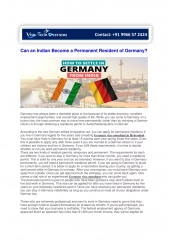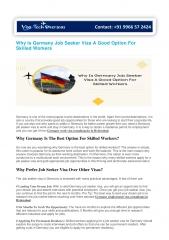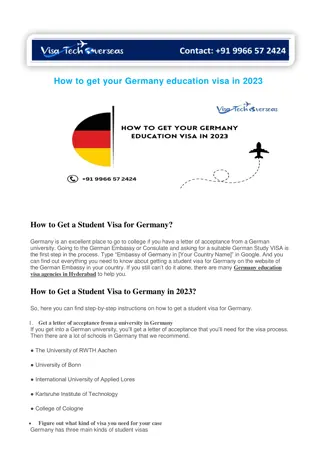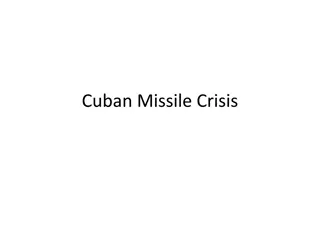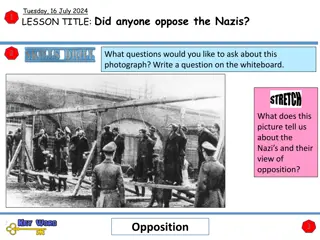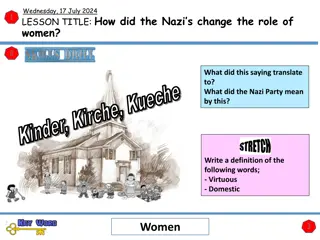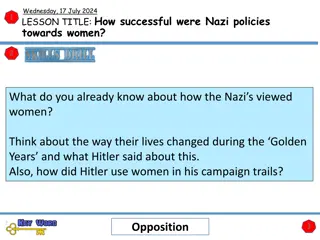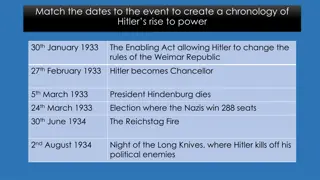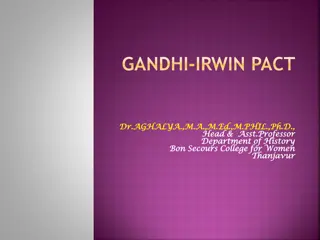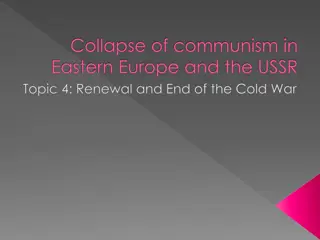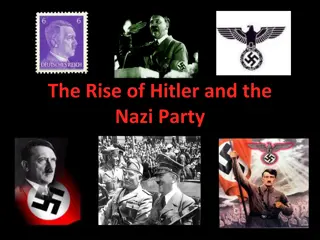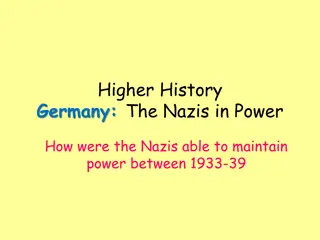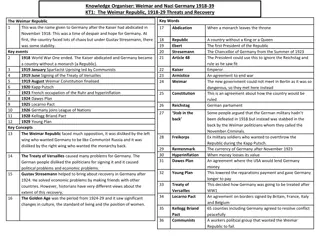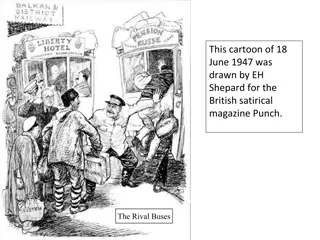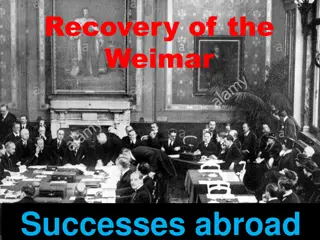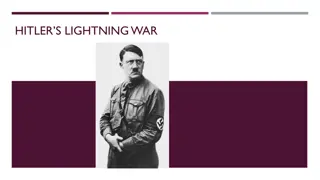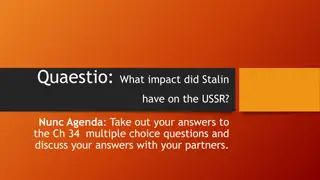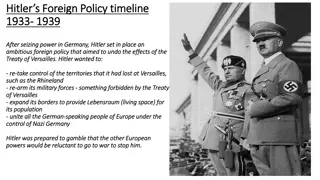The USSR and Nazi Germany: The Pact of 1939
In the lead-up to WWII, the USSR signed a non-aggression pact with Nazi Germany, shocking the world. This pact included secret clauses dividing Poland and avoiding conflict for ten years. The USSR's alliance with Germany was a strategic move by Stalin due to fear of invasion and perceived weakness of the allies. This pivotal agreement directly led to the invasion of Poland and played a significant role in the outbreak of WWII.
Download Presentation

Please find below an Image/Link to download the presentation.
The content on the website is provided AS IS for your information and personal use only. It may not be sold, licensed, or shared on other websites without obtaining consent from the author.If you encounter any issues during the download, it is possible that the publisher has removed the file from their server.
You are allowed to download the files provided on this website for personal or commercial use, subject to the condition that they are used lawfully. All files are the property of their respective owners.
The content on the website is provided AS IS for your information and personal use only. It may not be sold, licensed, or shared on other websites without obtaining consent from the author.
E N D
Presentation Transcript
USSR involvement in WW2 1. What can you see in the cartoon? 2.What can you infer from the cartoon about the USSR? Cartoon from September 1939. How useful do you think the content of the source is for an enquiry into WW2?
Why did the USSR have an alliance with Nazi Germany? Explain the USSR signed the Nazi-Soviet Pact Describe the key features of the Nazi- Soviet Pact Mastering Securing Developing Identify what the Nazi-Soviet Pact was
http://r73.cooltext.com/rendered/cooltext327196892554520.png Image result for key cartoon Nazi Pact Alliance
Background During the Russian Civil War the allies (Britain, France) supported the whites in attempting to overthrow Communism. The USSR became an outcast in Europe, as its desire to spread Communism made it unpopular with other countries. Germany was run by Hitler and his Nazi s in the 1930s. Germany s behaviour in the 30s made Stalin think that an invasion was going to happen. He decided that the allies were weak, and that he would instead negotiate with Nazi Germany.
The Nazi-Soviet Pact 1939 On 23 August, 1939, the world was shocked when, suddenly, Russia and Germany signed a 'Non-aggression Pact'. In the Pact they agreed to not attack each other for ten years. The two countries had made a number of a 'secret pacts' one of which was to split Poland. The Pact was the single most important short term cause of the Second World War as it led directly to the invasion of Poland.
Why did the USSR have an alliance with Nazi Germany? Complete the following 1. Why did Russia not negotiate with the allies? 2. Why did the USSR need to negotiate with Germany? 3. What were the key aspects of the Nazi Soviet Pact? Why did the Nazi-Soviet Pact lead to WW2?
Task Read the information and sort it into the Venn Diagram to show why the USSR signed the pact. Factors that pulled the USSR to sign the pact Factors that pushed the USSR into signing the pact. The USSR had no choice but to sign the Pact. How far do you agree?
Why did the Anglo-Soviet talks fail? (SCAB) Suspicion - a. In particular, they would not ever have allowed Russia to control Estonia, Latvia and Lithuania. b. The Russians thought Britain wanted to trick them into war against Germany. c. Poland did not trust that the Russians (who wanted to send troops into Poland), once in, would ever leave. Choice Why did the Nazi-Soviet pact happen (THUG) Time to prepare for war Stalin said: We got peace for our country for 18 months, which let us make military preparations . Hope to gain Stalin was sure that Russia could only gain from a long war in which Britain, France and Germany exhausted themselves. a. if Stalin supported Britain, he would end up fighting a war in Poland on Britain s behalf. b. On the other hand, Hitler was promising him peace, half of Poland and a 'sphere of influence' over eastern Europe. Appeasement After Munich, Stalin was convinced that Britain would break its promise to Poland. He was convinced that Britain would leave Russia fighting Hitler alone. Britain delayed a. At first, Lord Halifax refused Stalin s offer of a meeting. b. When the British sent an official, he could not make any decisions. Stalin got fed up with British delay. Britain could not send troops to fight in Poland, so Unhappy with Britain Stalin was insulted by Britain s slowness to negotiate, and did not trust Britain. When the Anglo-Soviet alliance failed, he turned to Germany. Germany Hitler wanted the alliance because only Russia could keep Britain s promise to defend Poland. He believed that, if he got a promise of peace with Russia, Britain would be forced to back down over Poland and Danzig.
G Explain two consequences . A01 A02 4 marks x2 AW Consequences = results Explain how the event in the question led to the result Specific details
Explain one consequence of the signing of the Nazi-Soviet Pact (4 mark) The question wants you to explain the result of something, in other words: what difference did it make? Use phrases such as as a result or the effect of this was in your answer to show the consequences.
Explain one consequence of the signing of the Nazi- Soviet Pact (4 mark) Level Mark Descriptor 1 1-2 Generalised information is included in the answer showing limited knowledge and understanding. (AO1) Specific information is used in the answer to support the explanation of the consequence and this shows good knowledge and understanding. (AO1) A simple or generalised comment is made about a consequence (AO2) 2 3-4 A consequence is explained and analysed for importance. (AO2) Point = Consequence: One consequence was Evidence = Specific Detail: This meant that Explanation = Analysis: As a result
Explain one consequence of the signing of the Nazi-Soviet Pact (4 mark) Point = Consequence: One consequence was Evidence = Specific Detail: This meant that Explanation = Analysis: As a result Explain why the USSR signed the Nazi-Soviet Pact. (12 marks)
Self Assess Checklist USSR capital letters Nazi capital letter and spelled correctly As a result or This led to because consequence at least one specific facts e.g. specific terms of the Pact


